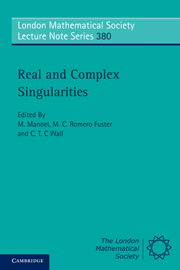Book contents
- Frontmatter
- Contents
- Preface
- 1 On a conjecture by A. Durfee
- 2 On normal embedding of complex algebraic surfaces
- 3 Local Euler obstruction, old and new, II
- 4 Branching of periodic orbits in reversible Hamiltonian systems
- 5 Topological invariance of the index of a binary differential equation
- 6 About the existence of Milnor fibrations
- 7 Counting hypersurfaces invariant by one-dimensional complex foliations
- 8 A note on topological contact equivalence
- 9 Bi-Lipschitz equivalence, integral closure and invariants
- 10 Solutions to PDEs and stratification conditions
- 11 Real integral closure and Milnor fibrations
- 12 Surfaces around closed principal curvature lines, an inverse problem
- 13 Euler characteristics and a typical values
- 14 Answer to a question of Zariski
- 15 Projections of timelike surfaces in the de Sitter space
- 16 Spacelike submanifolds of codimension at most two in de Sitter space
- 17 The geometry of Hopf and saddle-node bifurcations for waves of Hodgkin-Huxley type
- 18 Global classifications and graphs
- 19 Real analytic Milnor fibrations and a strong Łojasiewicz inequality
- 20 An estimate of the degree of ℒ-determinacy by the degree of A-determinacy for curve germs
- 21 Regularity of the transverse intersection of two regular stratifications
- 22 Pairs of foliations on surfaces
- 23 Bi-Lipschitz equisingularity
- 24 Gaffney's work on equisingularity
- 25 Singularities in algebraic data acquisition
24 - Gaffney's work on equisingularity
Published online by Cambridge University Press: 07 September 2011
- Frontmatter
- Contents
- Preface
- 1 On a conjecture by A. Durfee
- 2 On normal embedding of complex algebraic surfaces
- 3 Local Euler obstruction, old and new, II
- 4 Branching of periodic orbits in reversible Hamiltonian systems
- 5 Topological invariance of the index of a binary differential equation
- 6 About the existence of Milnor fibrations
- 7 Counting hypersurfaces invariant by one-dimensional complex foliations
- 8 A note on topological contact equivalence
- 9 Bi-Lipschitz equivalence, integral closure and invariants
- 10 Solutions to PDEs and stratification conditions
- 11 Real integral closure and Milnor fibrations
- 12 Surfaces around closed principal curvature lines, an inverse problem
- 13 Euler characteristics and a typical values
- 14 Answer to a question of Zariski
- 15 Projections of timelike surfaces in the de Sitter space
- 16 Spacelike submanifolds of codimension at most two in de Sitter space
- 17 The geometry of Hopf and saddle-node bifurcations for waves of Hodgkin-Huxley type
- 18 Global classifications and graphs
- 19 Real analytic Milnor fibrations and a strong Łojasiewicz inequality
- 20 An estimate of the degree of ℒ-determinacy by the degree of A-determinacy for curve germs
- 21 Regularity of the transverse intersection of two regular stratifications
- 22 Pairs of foliations on surfaces
- 23 Bi-Lipschitz equisingularity
- 24 Gaffney's work on equisingularity
- 25 Singularities in algebraic data acquisition
Summary
Abstract
A survey of equisingularity theory focussed on Terry Gaffney's work.
The article begins with an account of the early history of equisingularity. Next I develop notation, particularly for polar varieties; recall the theory of integral closures of ideals, show how Gaffney generalised this to integral closures of modules, and list a variety of applications he has made.
The invariants available are classical and Buchsbaum-Rim multiplicities of modules, polar multiplicities and Segre numbers of ideals, and generalisations to modules. Some of the main theorems are of the form: the constancy of certain numerical invariants of a family imply equisingularity of the family (usually in the form of Whitney triviality). Many of the proofs use results showing that constancy of some invariants implies an integral dependence relation. One notable paper gives a sufficient condition for topological triviality of families of maps.
Introduction
The classification of singularities of plane curves was achieved in 1932 by Brauner [2], Burau [6], [7] and Zariski [60]: it yields an easily stated, necessary and sufficient condition for topological equivalence, which clearly does not imply analytic equivalence. Probably the simplest example is the case of 4 concurrent lines xy(x + y)(x + ty) = 0 with t an invariant of analytic, but not of topological equivalence.
This situation presents the problem of creating a theory of equivalence of families of objects (e.g. algebraic varieties or morphisms) which will say when the members of the family are essentially the same.
- Type
- Chapter
- Information
- Real and Complex Singularities , pp. 350 - 377Publisher: Cambridge University PressPrint publication year: 2010
- 1
- Cited by

